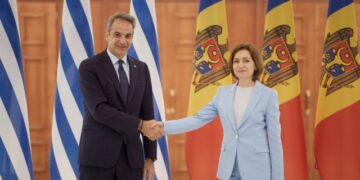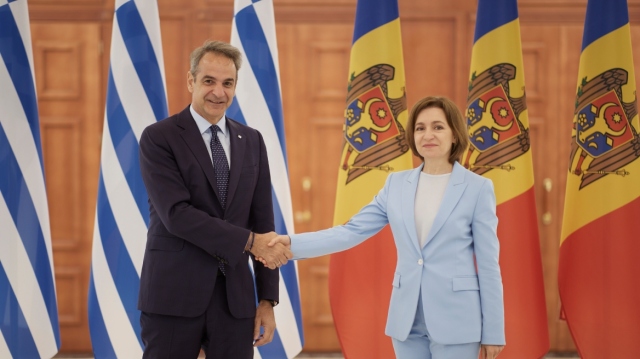Greek Prime Minister Kyriakos Mitsotakis made a historic visit to Moldova—the first by a Prime Minister of Greece—where he met with Moldovan President Maia Sandu and Prime Minister Dorin Recean.
During their discussions, they expressed a mutual interest in strengthening bilateral relations and expanding cooperation in areas such as trade, economy, and energy, alongside providing expertise to help Moldova align with EU standards.
In his meeting with President Sandu, Prime Minister Mitsotakis underscored Greece’s role in enhancing Moldova’s energy security. He noted that the transfer of natural gas from Greece to Moldova and Ukraine via the Trans-Balkan pipeline is vital for Europe’s overall energy security and the success of the Vertical Gas Corridor.
He also highlighted significant opportunities for collaboration in renewable energy, where Greece excels, and in connectivity projects that could benefit the entire region.
The leaders also touched upon regional and international developments, focusing on Ukraine and sharing insights regarding Ukraine’s European progress.
Accompanied by President Sandu, Mitsotakis toured the historic house of Michail Katsikas, a former headquarters of the Filiki Eteria in Moldova, which Greece aims to acquire.
Key Remarks from Kyriakos Mitsotakis During the Joint Press Briefing:
“Dear President Maia, thank you for your warm welcome and kind words. It’s a true honor to be the first Greek Prime Minister to visit Moldova, a nation with which Greece shares deep historical and cultural ties. I also appreciate your acknowledgment of Alexandros Ypsilantis’ significant role here, marking a poignant start to our national quest for independence.
This visit reaffirms my commitment to deepening our cooperation, strengthening our bilateral ties, and building a shared European future. President Sandu and I engaged in a fruitful discussion on various cooperation topics and confirmed the excellent state of our bilateral relations.
Our communities in both countries foster enduring connections. The recent opening of our embassy in Chisinau serves as a symbol of our intent to enhance bilateral relations and explore future potentials. As you mentioned, we have significant untapped opportunities to boost our trade and business ties.
We had in-depth discussions on energy cooperation. Greece can bolster Moldova’s energy security through the Southern Gas Corridor and the Revythousa terminal, particularly via the Alexandroupoli FSRU, positioning Greece as a reliable energy provider for regional partners. We reviewed how this pipeline could operate efficiently and competitively, which is essential for both Moldova and Ukraine.
We also explored Moldova’s renewable energy potential. Both Moldova and Greece have made impressive strides—over 50% of our electricity is now sourced from renewables, frequently meeting 100% of our needs with wind, solar, and hydro energy. We encourage Greek companies to actively engage in renewable energy projects in Moldova, and I’m optimistic about seeing tangible outcomes soon.
I’m pleased we discussed the need for connectivity. Establishing direct flights is crucial; Greece is a popular destination for Moldovan tourists, and we also wish to encourage Greeks to explore Moldova’s rich historical and cultural connections.
We acknowledged Moldova’s remarkable progress in the IT sector—a field where Greece is also advancing rapidly. This presents opportunities for further collaboration.
I reaffirmed Greece’s steadfast support for Moldova’s independence and territorial integrity, fully aware of the complexities your country faces post-Russia’s invasion and the ongoing conflict in Ukraine. Greece stands by you, and you can always count on our support.
Moreover, I reiterated our commitment to Moldova’s European journey. As a member since 1981, we understand how vital this journey is for geopolitical stability. We strongly advocated for Moldova’s candidate status and the initiation of accession talks.
I commend President Sandu for Moldova’s advancements towards EU membership. Despite facing significant challenges, you are undertaking essential reforms to align with EU standards. We wholeheartedly support your ongoing efforts and encourage you to maintain this positive momentum.
Yesterday, President Sandu and I, along with other Southeast European leaders, gathered in historic Odesa for the 4th Ukraine–Southeast Europe Summit. Greece initiated the first summit in Athens last August, and I’m delighted to see this initiative progress. We reaffirmed our support for Ukraine and recognized Moldova’s pivotal role in this geopolitical framework.
We also discussed ambitious connectivity projects, including a corridor plan from Alexandroupoli to Odesa through Bulgaria, Romania, and Moldova. This initiative would enhance regional connectivity and convey the message that both Moldova and Ukraine belong within the European family.
Maintaining the integrity of the EU enlargement process and committing to the Western Balkans is imperative. We view enlargement as a strategic investment in peace, stability, prosperity, and security in the region, especially urgent in today’s geopolitical climate.
In closing, it has been a pleasure to conclude this visit by exploring the Katsikas house, a significant landmark in Chisinau, which symbolizes our 1821 independence struggle.
Thank you once again, Maia, for this productive dialogue. We have shared goals to pursue, and I look forward to our next meeting.”
In Response to a Journalist’s Inquiry Regarding Moldova’s EU Accession Path:
“It is not my role to advise a foreign government on its EU accession process. The roadmap is clearly outlined. It is a complex, merit-based procedure that presents challenges; nevertheless, it is worthwhile. We are here to provide any necessary technical support.
Reforms associated with the EU path may be arduous or politically demanding, but they yield long-term benefits.
In an environment where populist rhetoric is gaining traction, it’s crucial to emphasize that Europe and European integration represent a pillar of stability. I believe this is the direction Moldova should pursue, as the advantages far outweigh any immediate costs.
It’s vital for this message to originate from an early EU member like us. We too faced adversities. A mere decade ago, Greece was on the verge of collapse, nearly exiting the Eurozone due to misguided negotiations by the government at the time. We averted disaster and are grateful for that.
Thus, Moldova’s European path will ultimately benefit all Moldovan citizens, which is why we wholeheartedly support it.”
Ask Me Anything
Explore Related Questions

















